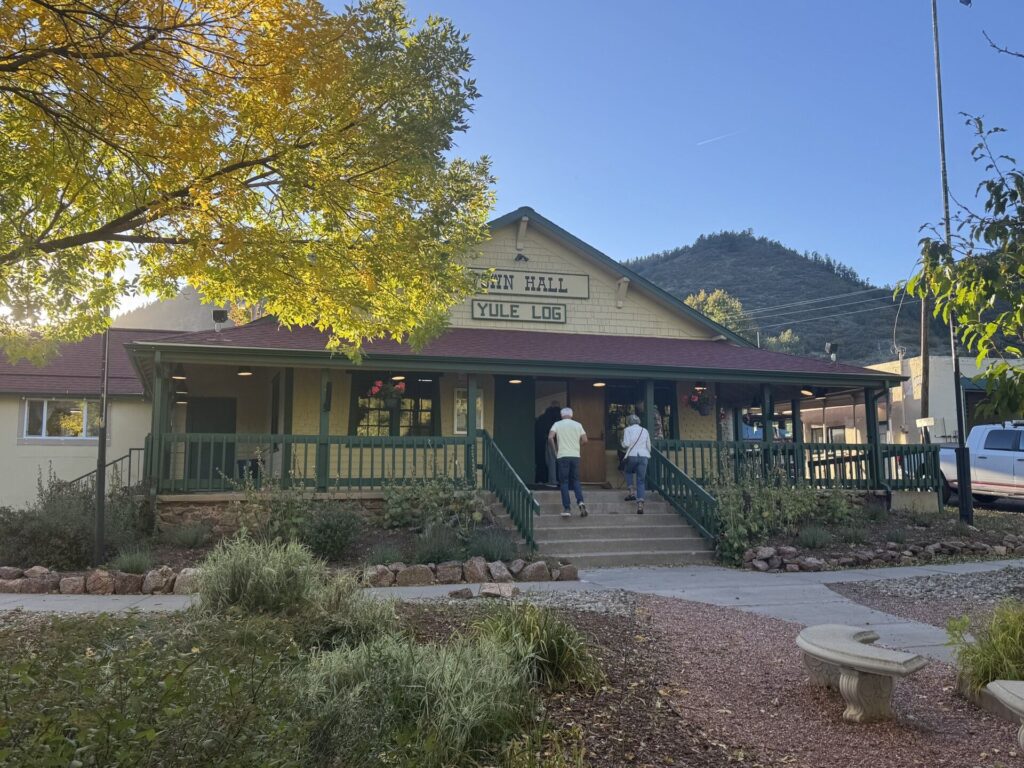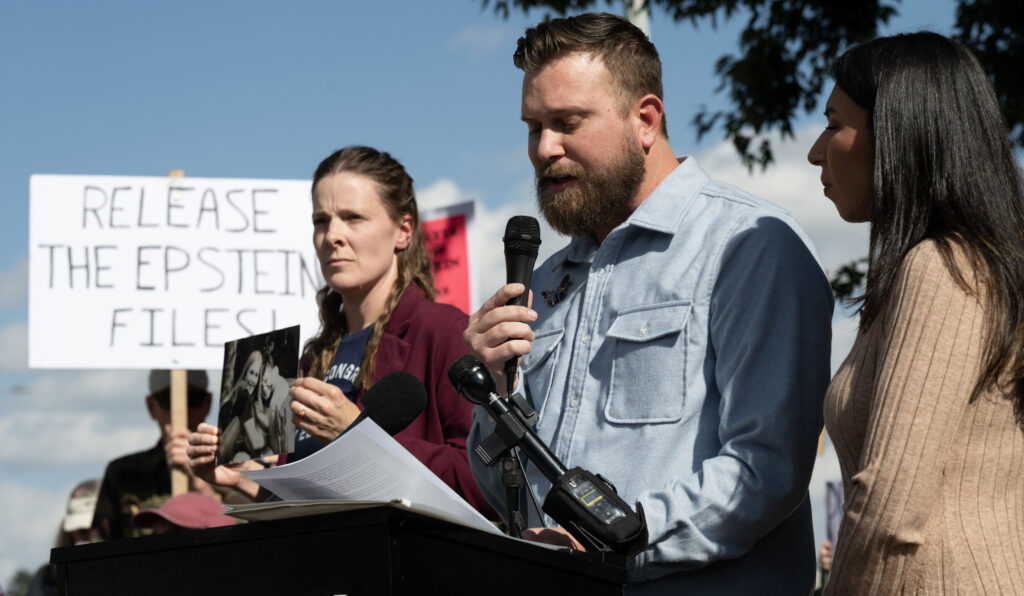Guzman: ‘I came to the Legislature to repeal the death penalty’
Senate Minority Leader Lucia Guzman’s death penalty repeal bill was voted down by Republicans in committee Feb. 15, just as she expected. Speaking before the hearing, Guzman said she hoped mainly that the bill would foster heartfelt conversation on the issue.
“It was not to be,” she said. She thinks she might have pulled off the repeal if Democrats in November had won a majority in the state Senate, but Republicans maintained the majority by one vote. She shrugged. “Maybe it’s the conversation that’s important, going through all these steps together. I think that’s a good legacy.”
Guzman, a Denver Democrat, arrived at the Senate as an appointee in 2010, filling the District 34 seat vacated by Paula Sandoval. Guzman is term limited and has only one more session to serve at the Capitol. She is also a minister with a degree from the Iliff School of Theology in Denver – and that’s the part of her background that seems closest to surface when she talks about capital punishment.
“You know, I came to the Legislature to repeal the death penalty,” she said. “That’s why I wanted to run for the Senate – the main reason. I believe that Colorado can never be its best as long we’re entangled with this [death penalty] statute. As a state and community, transformation is what we need, and transformation comes only when there’s opportunity for people to have the time to grow. If you just slap the death penalty onto people, there’s no way to grow, in my opinion. It doesn’t provide closure.”
Guzman met with reporters mostly one on one to talk about her Senate Bill 95. She said she didn’t want to hold a press conference. She wanted to talk about this bill sitting down face to face.
Murder and frustration
Passions run high in Colorado around the death penalty, and not always along partisan lines. The last execution performed in the state took place in 1997, when authorities gassed Gary Lee Davis, a convicted murderer and rapist. Three men now wait on death row.
In 2013, Gov. John Hickenlooper granted convicted murderer Nathan Dunlap an indefinite reprieve. The decision drew intense criticism from death penalty supporters and opponents. They called the decision weak for the fact that it signaled the governor’s opposition to capital punishment as it is practiced today even as it left Dunlap subject to the leanings of the state’s next governor.
In 2015, Colorado death penalty supporters were shocked that James Holmes, the Aurora Theater shooter who killed 24 people, escaped a death sentence. He received 12 life sentences without parole. Jurors found they couldn’t send a man they thought was mentally ill to an execution chamber.
The sentence was a blow to hard-charging Republican DA George Brauchler, who testified against Guzman’s bill.
Berthoud Republican state Sen. Kevin Lundberg ran a bill the year after the Holmes trial that echoed frustration felt in many corners of the state. His Senate Bill 64 aimed to eliminate the requirement that 12 jurors unanimously agree to impose a death penalty. The bill died in committee. Guzman strongly opposed it.
Crime and punishment and justice
In her introductory remarks at the hearing for her bill this year, Guzman told the Senate Judiciary Committee that she was appearing before them as a senator and as a victim.
“Senate Bill 95 basically brings us to a question: Should we kill someone who kills someone? We’re here today to talk about crime and punishment and justice. How do we as a society build and maintain a system of justice for all.”
She then read aloud excerpts from a story printed in the 1975 newspaper she keeps in the plastic folder. The story reported the murder of her 72-year-old father, Tom Guzman, in Katy, Texas, the small town where her family lived.
“He died Sunday morning after being hit in the head during a robbery at the Highway 90 all-night service station where he worked,” she said.
The murderer made off with $7 from Tom Guzman’s pocket. The cash register was still locked. The murder weapon, a 12-inch crescent wrench, was found in a field with a pair of the criminal’s shoes.
“The man on the floor of that gas station was my dad. He wasn’t feeble. He was quite strong.
“It’s amazing to me that the man arrested was not charged with murder or robbery,” Guzman said, explaining that the murderer received a lesser charge tied to what was described as an “argument over small change.”
“Parts of my dad’s skull were left on the floor … But what I learned is you can change things around. There are so many things that come into play in these cases. In Colorado, so much depends on what judicial district you live in … There’s no across the board rules.
‘We got justice’
The other two men on death row in Colorado are Sir Mario Owens and Robert Ray, gangland hoods who evoke little sympathy in any quarter. Ray killed Gregory Vann in 2004 and then orchestrated the murder of Javad Marshall-Fields and his fiancee, Vivian Wolfe, in 2005 to prevent them from testifying in the Vann case. Owens was Ray’s trigger man in the death of Marshall-Fields and Wolfe.
Sen. Rhonda Fields, the mother of Marshall-Fields and a Democrat from Aurora, has been a powerful voice at the Capitol in support of the death penalty, as has been her daughter Maisha Fields.
Guzman said she has engaged in conversation with Sen. Fields on the issue, working to understand her position and sharing her own.
“Really though my response to Fields comes from being a Senate Democratic leader, not as an individual senator,” Guzman said. “So, I am here to help her to deal with this in her capacity, as she needs to, that comes first.”
Maisha Fields gave perhaps the strongest testimony at last week’s hearing in favor of the death penalty.
“It was seven days before he was set to testify,” Fields said about her brother.
“We were able to get justice – justice for Javad and Vivian. The only punishment available at that time – because the defendants were already serving a life sentence – was death,” she said.
“I’m ashamed that we’re here today, because I feel as if all the hard work that the 12 jurors have done, the police department, and that the life that my brother and his girlfriend Vivian lived, will be in vain. Have the political courage to say ‘no'” on the bill, she told the committee members.
Shadow supporters
Guzman ran a death penalty repeal bill in 2013. That’s a long time ago when it comes to the death penalty. DNA testing has exonerated a series of death row inmates around the country. Evidence piles up about racial inequities in capital cases and about mentally ill defendants terribly defended. Drug manufacturers refuse to sell execution drugs to state officials and executions have gone awry, resulting in plainly torturous deaths and then lawsuits.
Guzman said the thinking in 2013 was that repeal bill sponsors would in the end present a sort of de facto repeal – a moratorium, perhaps, or a proposal that severely narrowed the circumstances under which district attorneys could bring capital charges.
There has been movement in Colorado away from the death penalty, Guzman said. She said she knew “two or three Republicans” who would be soft or shadow supporters.
“That I didn’t see before,” she said. “It’s mostly on religious grounds. It’s like, they say: ‘When I look at myself in the mirror, I don’t think we should have the death penalty, but I don’t want to run a repeal bill or sponsor one.”
Guzman said she thinks the state’s DAs remain firmly against repeal.
Others have told Guzman they don’t believe executions will actually take place anymore. Years drag on. Legal cases stop and start. And frustrations build.
“It’s been 20 years for Nathan Dunlap and ten years or so for the other two men on death row,” said Guzman. “It’s probably not going to happen. So wouldn’t it just be better to commute all of that and let us be done with it, for the families, instead of all of this coming up every two years?”
Extending an apology
The day before the hearing for Guzman’s repeal bill, Robert Dewey visited the Capitol. Dewey was wrongly convicted in 1996 of the brutal rape and murder of Jacie Taylor, a Palisade teenager. Dewey was sentenced to life in prison and served 17 years until, in 2012, he was found to be innocent of the crime.
Dewey was testifying in favor of a bill sponsored by Guzman that would see compensation paid in a lump sum to exonerated Colorado prisoners, a change supporters argue helps adjustment to life outside of prison. The judiciary committee members voted unanimously in favor of the change.
“I just want to extend an apology to you and for what you have endured,” said Sen. Fields. “I’m so glad we live in a state that has a system in place to provide compensation to help you address the problems you face.”
“Let me echo Sen. Fields’s comments,” said Bob Gardner, a Republican from Colorado Springs.
“There would be no compensation for Robert Dewey if he had been put to death,” said Guzman, adding that the way it all happened was admitted tragedy enough.
“Justice comes when there’s transformation,” Guzman said. “I had to transform my life over these 30 years to deal with the fact that my father died unnecessarily and brutally. I was the one still alive. It was my responsibility to change and to grow. Maybe it would have been easier if someone said: ‘Justice has been done. That guy who killed your father, he’s dead now.’ But I don’t think so. There’s no room in between.”











